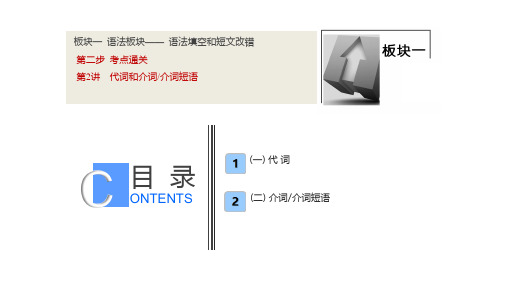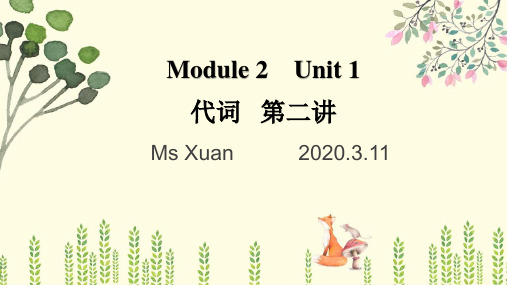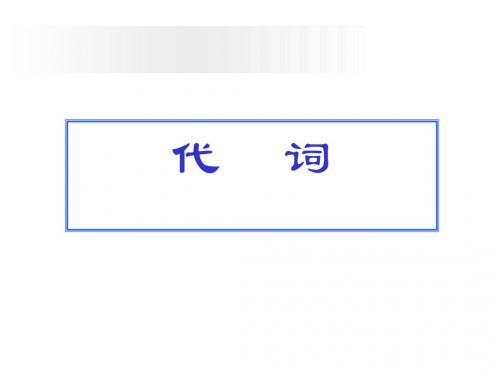第二讲 代词
- 格式:docx
- 大小:26.58 KB
- 文档页数:11




代词复习第二讲不定代词的用法(浙江省杭州市萧山市)中考复习代词(第二节不定代词辨析)一. 用some 、any和no 填空1.I bought ________flowers on my way home.2.I asked her for _______paper, but she didn’t have_____3.My brother doesn’t need _____help.4. Would you like to have_____bananas? Yes, I’d like to.5.Do you have _______ good books?6. There is ______good news in today’s newspaper. So there’s no need to read it.7. Lucy has _______bike and she often rides her sister’s bike.8. ______ of the plants grow well.总结some 、any、no的用法二. 用many 和much填空1.________students helped the man move the car.2. There are _______mountains around our house.3. I’m busy and I have _______homework to do.4. _______ of them have left for England.5. I ca n’t understand ________of his speaking6. I like milk, so I drink ________every day.7.John wants to join the music club very _______.总结many、much的用法三. 用each 和every填空1.________of the boys has a book.2.________ student has an English-Chinese dictionary in our class.3.Many trees are planted on ________side of the road★4. We ______ are healthy because we run every day.总结every,each的用法四. 用either 和neither填空1.L ily and Lucy both like singing, but ______ of them is good at dancing.2. We water the trees and flowers on ______side of the river every day.3. ---When shall we meet, this evening or tomorrow morning?---I don’t mind. _______is OK.4. ---Can you speak Chinese or Japanese?---______, but I can speak English.5. She can’t dance________.6. Tom didn’t finish homwork. . ______did his sister.总结either 、neither 的用法五. 用both 和all 填空1._____of my parents are teachers.2. _____of the students in Class 3 have gone out.3. There are trees and flowers on ____ banks of the river4. ______of the twins are good at English5. ______the food in the shop has gone bad.6.H e likes ______ the subjects in the school.7.T he man has two sons, and _____of them are doctors.总结both、all 的用法六. 用another和other、others1 Lei Feng is always ready to help ________.2 Some are planting trees, some are carrying water, and _______ are watering the trees .3.I have got ten pencils. Two of them are red , the _______ are blue.4 She held a pen in one hand and his notebook in the ________.5 I have read three stories. I’ll go on to re ad _____.6 Can I have _________ three cakes?总结another 和other 的用法七. 用no one 和none填空1.T here is _________ in the room.2.________ of the students is afraid of difficulties .3. --How many fish did you catch?--______.4.--Who is in the classroom?--_________总结no one 和none 的用法八. 用few, a few, little, a little填空1.There is ________milk. I needn’t buy any.2. Bob can’t buy the pen because he had _______ money with him3.I have_______ apples here. Here you are.4. I’m new here, so I have ________friends5. We must be quick. We have ________time left.。


初三英语暑假班(教师版)1.词汇already~ averageplete the following sentences with the words or phrases in the box. Each can only be used once and notice there is one word or phrase more than you need.anywhere ancient as soon as amount attract audience already amusing one another one after another at the same time1.I don’t find his jokes at all .2.So far, she has written several successful computer games.3.Read the instructions and then cook the food for the right of time.4.Students often work together in groups and share their ideas freely with .5.The most surprising thing about it, however, is that it can land on snow, on water, or even ona ploughed field.6.Researchers believed Greece and Rome were important sources of learning.7.I telephoned the booking office I heard the news.8.Because the gun was in a plastic case, the magnet(磁铁) could not it.9.Washing machines and vacuum cleaners enable us to wash clothes and clean our houses .10.The of this advertisement was mainly teenagers.【难度】★【答案】1. amusing 2. already 3. amount 4. one another 5. anywhere 6. ancient 7. as soon as 8. attract 9. at the same time 10. audienceplete the following sentences with the given words in their proper forms.1.My is to be an architect when I leave school.(ambitious)2.In the 20th century, there were many inventions.(amaze)3.If I fail to by 7 o’clock, I will not be coming at all.(disappear)4.She to her friend for not being able to write to him last month.(apology)5.The woman walked out of the shop and decided to punish the assistant the next day.(angry)6.Have you to meet him?(arrangement)7.I was pleased to hear that he home safely.(arrival)8.Breathing is an function of the body.(automatically)9.They divided themselves into two groups: the writers and the .(art)10.Yesterday we had a debate. We about whether we should encourage people to keep pets.(argument)11.When trying to memorize something, you should focus your and concentrate on the most important things about it.(attend)【难度】★★【答案】1. ambition 2. amazing 3. appear 4. apologized 5. angrily 6. arranged 7. arrived8.automatic 9.artists 10.argued 11. attentionIII.Sentence transformation.1.We have invited fifty people in all.We have invited fifty people .2.His invention not only changed America but the whole world as well.the whole world.His invention not only changed America3.Her sister plays the piano better than her.She doesn’t play the piano her sister.4.The shop had nothing on sale this week.The shop didn’t on sale this week.5.We got to Paris yesterday, safe and sound.We Paris yesterday, safe and sound.We Paris yesterday, safe and sound.【难度】★★【答案】1. altogether 2. but also 3. as well as 4.have anything 5. reached…arrived inplete the following sentences with proper words. The first letter of each word has been given.1.Did you do a special during the weekend?2.I don’t like this room. I’m going to ask for a .3.He has had a lot of students. A them are managers, lawyers, doctors and scientists.4.A Brazil is one of the richest countries in the world, much of it has not yet been developed.5.The man a the old woman with a knife.6.He is thin, and of a height, but he is very fit.7.Students have different a towards the uniform rule.8.The detective found out that the shop a was her daughter.9.They don’t have to keep a their parents for money all the time.10.One morning, something unusual happened while the fisherman was a work.11.Everybody a me was smoking and I felt extremely uncomfortable.12.After reading an a named “Cigarette Smoking and Your Heath”, I lit a cigarette to calm my nerves.【难度】★★【答案】1. anything 2. another 3. among 4. although 5. attacked 6. average 7. attitudes8.assistant 9. asking 10. at 11. around 12. articleplete the following sentences according to the Chinese given.1.Tom called Linda yesterday, and Linda’s mum (接电话).2.She has never (实现她的雄心) becoming a famous writer.3.The problem was so simple (几乎任何人都可以解出).4.The old woman (生她孙子的气) because the thought that he had never visited her.5.I think I (有空) tomorrow morning.6.Most people believe that the rain (将持续至少一周).7.Everyone can (申请自己的电子邮箱地址) on the Internet.8.They (参加一个讲座) Man and the Environment yesterday.9.The house (占地) 250 square meters with three bedrooms, a sitting room, a kitchen, a bathroom and a big yard.10.Yesterday a French friend (带我参观一些世界著名的旅游景点) in Paris such as the Eiffel Tower, the Arch of Triumph, the Louvre and Notre Dame.【难度】★★【答案】1. answered the phone 2. achieved her ambition of 3. that almost anyone could solve it(work it out) 4. was angry with her grandson 5. will be available/free 6. will last for at least a week 7. apply for his or her own email address 8. attended a lecture on 9. has/covers an area of 10. showed me around some (of the ) world-famous tourist attractionsPresentation真题讲解中考英语选择题人称 第一人称第二人称 第三人称 单复数单 复 单 复 单 复人称代词主格 I we you you he; she; it they 宾格weusyouyouhim; her; it them人称代词(主格)的用法例句作主语She reads English every morning. We and they are going to have a picnic. You, he and I are in the same school. 人称代词(宾格)的用法例句常位于宾语(动词、介词)后He always helps us.We are planting trees with them. Let the girl stand between you and me.2) 物主代词人称 第一人称 第二人称 第三人称 单复数单 复 单 复 单 复物主代词形容词性 my our your your his; her; its their 名词性mineoursyoursyourshis; hers; its theirs形容词性物主代词的用法例句作定语I love my parents.Can you lend me your notebook? They clean their classroom every day.名词性物主代词的作用例句作主语 Is this her puppy? No, hers is white. 作表语 These new computers are ours. 作宾语Tom’s bike is broken. He is using mine.2.语法:代词3)指示代词:this, that, these, those—Is this your cat?—Yes, it is.The weather in Guangzhou is hotter than that in Shanghai.6)不定代词some 一般用于肯定句,any 一般用于否定句和疑问句。
第二讲汉语人称代词的发展现代汉语的第一、第二、第三人称代词,其中第一、第二人称代词商代就产生了,第三人称代词产生较晚,在中古的南北朝时期。
一、商代的人称代词商代甲骨卜辞已经产生了第一和第二人称代词,尚未产生第三人称代词。
1、第一人称代词有“我”“余”“朕”三个。
三者的区别是:我,多表复数,也表单数。
从语法功能上,可做主语、宾语、定语。
(我们,我们的,我,我的)如:庚申卜,贞:我受黍年。
我,表示复数的我们,代表商朝。
做主语。
(“我”的这种单复数同形的功能现代汉语中仍有孓遗,如我国、我校,“我”都表复数)()侵我西鄙田。
(定语,我的)余,只表示单数,做主语和宾语,不做定语。
(我)羌甲祟余。
(宾语)朕,用于单数,主要做定语,有时也做主语。
(我的)甲戌卜,王,余令角婦协朕事。
2、第二人称代词有“女(汝)”“乃”“尔”,单复数同形。
其区别是:汝,可做主语、定语、宾语。
乃,做定语。
(你的,你们的)尔,做定语、宾语。
3、甲骨文到周秦两汉汉语中的“之”“其”“彼”“厥”。
这些词有时翻译成现代汉语的“他”“他们”,但它们仍然是指示代词性质,偶尔指代第三人称,但不是人称代词。
商代至周秦还没有产生真正的第三人称代词。
二、周秦的人称代词(一)到周代,商代产生的3个第一人称代词继续使用,又产生了“吾”“卬”“台”“予”4个,共7个。
其使用频率和用法各不相同。
1、“我”,周秦应用普遍,功能同商代用法。
如:我未见力不足者。
(单数,主语)父母之不我爱,于我何哉。
(宾语,单数)无矢我陵,我陵我阿。
(复数,我们的)2、吾,只作主语和定语。
(一般不做宾语,只有在特定的条件下才做)可表示单、复数。
季氏使闵子骞为费宰,闵子骞曰:善为我辞焉,如有復我者,则吾必在汶上矣。
《论语·雍也》夫子欲之,吾二臣皆不欲也。
(主语,复数,我们)在否定句的宾语前置结构中,“吾”才可以用作宾语。
居则曰:不吾知也。
上古“我”“吾”的单复数没有词形上的区别。
第二讲代词英语代词分为人称代词、物主代词、指示代词、反身代词、疑问代词和不定代词六种。
(一)人称代词:起代表人或事物的作用,有人称、数、格的变化。
它们的主格和宾格形式是:I---me, you---you, he---him, she---her, it---it, we---us, you---you, they---them.e.g. They gave me a book.(二)物主代词:表示所有关系。
分形容词性和名词性两种。
形容词性物主代词有my, your, his, her, its, our, your, their. 名词性物主代词有mine, yours, his, hers, its, ours,yours, theirs.e.g. Her mother is a doctor. This book is mine.(三)指示代词:用来区别人和事物。
常用的指示代词有this, that, these, those, such, etc.e.g. These are apple trees.(四)反身代词:表示强调或表示动词所表达的动作返回到作者本身。
反身代词有myself, yourself, himself, herself, itself, ourselves, yourselves, themselves.e.g. Let’s ask Mr. Li himself.(强调)(五)疑问代词:表示疑问,一般放在句首,构成特殊疑问句。
疑问代词有who, whom, whose, what, which, etc.e.g. Who are you looking for?(六)不定代词:主要用来不指明特定的人和物。
不定代词大多代替名词和形容词。
不定代词主要有some, any,no, both, all, every, each, either, neither, much, many, few,a few, little, a little, 以及由some, any, no等合成的复合不定代词, 如something, anything, nobody. 复合不定代词有定语时,定语要放在后面。
知识梳理:提纲挈领,抓住重点和难点!一、代词的分类英语中常把代词分为人称代词、物主代词、反身代词、指示代词、疑问代词、连接代词、不定代词和相互代词。
二、代词的用法1.人称代词:人称代词是指人的代词,有性、数、格的区别。
(1)人称代词主格在句中作主语。
例如:She is my English teacher.(2)宾格在句中作宾语(动词宾语或介词)。
例如:They don’t want me to go there alone.Don’t worry. I can look after her.(3)人称代词作表语时,一般用宾格,但在比较正式的场合用主格。
例如:—Who’s that? —It’s me.(非正式)/——It’s I.(正式)注意:①人称代词we, you, they 可以用来表示一般人。
例如:You cannot go into the hall with slippers. 不准穿拖鞋进入大厅。
②人称代的主格作表语,一般都在正中的谈话中,表示强调。
例如:It was he who took away the necklace. 是他拿走了那条项链。
③人称代词she可以用指代祖国、大地、月亮、轮船等。
例如:We love our country, we hope she’ll be stronger and stronger.我们热爱我们的祖国,我们希望她越来越强大。
④It作为人称代词时,可以表示天气、距离、时间、环境等。
例如:It is about 10 kilometers from here. 离这儿大约有10公里。
⑤It 还可用作形式主语或形式宾语,来代替由不定式,动词的-ing,形式或主语从句构成的真正的主语或宾语,以避免句子头重脚轻。
例如:It is not easy to learn English well.It is good for you taking a walk after supper.I found it difficult to sleep.⑥英语里当主语是并列的几个人时,人称代词的排列顺序和汉语不同,I 在最后,you 在最前;但是,当受到批评或时承认错误时正好相反,I 在最前,you在最后。
例如:You, he and I are all the winners.I, Li lei and you are wrong. We should do more for the project.2.物主代词:表示所有关系的代词叫物主代词。
物主代词包括名词性主代词和形容词性物主代词。
(1)形容词性物主代词在句中具有形容词的特征。
在句中作定语,后面跟名词。
例如:To our surprise, he has passed the exam.(2)如果名词前用了形容词性物主代词,就不用冠词、指示代词等修饰。
That is her pen.(3)与形容词一起修饰名词时,形容词性物主代词要放在形容词前。
例如:his English book(4)名词性的物主代词具有名词的特征,在句中作主语、表语、宾语。
相当于形容词性物主代词+名词。
例如:May I use your bike? Mine is at school. (作主语)Whose glasses are these? They are hers. ( 作表语)My dictionary is lost. Can I use yours? (作宾语)(5) 名词性物主代词可以与of 连用,作定语。
例如:A friend of ours are waiting for us.3.反身带词:用来表示“某人自己”的代词称为反身代词。
如下表所示:(1)反身代词在句中常用宾语,句子的主语和宾语是同一人或物。
例如:Her sister is too young to dress herself. (作宾语)He himself is always making such mistakes. (主语同位语)You’d better ask your wife herself. (宾语同位语)(2)反身代词可与其他词构成固定搭配。
4.指示代词:表示时间和空间远近关系的代词叫指示代词。
见下表指示代词可在句中作主语、宾语、表语、定语等。
例如:Those are my parents. ( 作主语)The toys little Tom likes are those in the basket. ( 作表语)These pictures are drawn by an old blind man. ( 作定语)注意:(1)前面刚刚提到过的东西,常用that, those 表示。
例如:I’m sorry to hear that.( 2 )下文将要提到的事情,可用these, this 表示,起启下的作用。
例如:Tell the children to do like this: knock the stick into the earth first, then tie the tree to it.5.疑问代词:用来构成特殊疑问句的代词叫疑问代词。
常用的有:who, what, which, whose, whom,在句中常作主语、宾语、定语、表语。
(1)who 主格,在句子作主语、宾语、和表语。
例如:Who is he?(2)whom 宾格,在句中作宾语。
例如:Whom did you look for?你在找谁?(3)whose所有格,在句中作定语或表语。
Whose pen is this ?Whose is this book?(4)what 在句子作主语、表语、宾语、定语。
What has happened?What colour do you like best ?(5)which 在句中作主语、定语、宾语。
Which book is more interesting?Which do you like better,this one or that one?6.相互代词:用于表示相互关系的代词。
常用的有:each other, oneanother. 相互代词可以作宾语、定语。
例如:We should help each other.The villagers have looked after one another these year.相互代词后可以加’s,表示所有关系。
例如:We put the presents in each other’s stocking.7. 不定代词:不定代词没有确定的对象(不指明替代任何特定的名词),常用的有:all, each, every, both, either, neither, one, none, little, few, many,much, other, another, some any, no以及由some, no, any, every 构成的复合词。
(1)some 和any(2)each 和every不定代词通常可以做主语、宾语、表语、定语,而none及含有some, an every 的合成代词不能做定语,no和every 只能做定语。
代词many, few, a few修饰可数名词,much, little, a little修饰不可数名词。
both, either, neither, each用于指两者,all, any, none, every, another 用于指三者或三者以上。
例题解析:举一反三,学的更轻松!1.This isn’t ______ pencil case. I left ______ at home.A. my, mineB. me, myC. I, myD. my, myself解析:此类题主要用于考查学生对人称代词、物主代词和反身代词的掌握情况。
要做好这类题,就必须熟练掌握这三类词的用法。
应选A。
2.The English novel is quite easy for you. There are ______ new wordsin it.A. a littleB. littleC. a fewD. few解析:历年来中考始终将little, a little, few, a few作为一个重要考点,要做好这类题,必须明确几点:(1)little, a little修饰或代替不可数名词;few, a few修饰或代替可数名词复数。
(2)few, little 一般表示否定意义;a few, a little表示肯定意义。
应选D。
3.------ Can I come this evening or tomorrow morning?------ ______ OK. I’m free today and tomorrow.A. EitherB. NeitherC. BothD. None解析:此类题主要是针对each, every, both, all, either, neither, none 等不定代词的考查。
Both指两个人或物;all表示三者或三者以上“都”,它们都表示肯定意义,均与of连用,作主语时,谓语动词用复数形式,作定语修饰复数名词。
all也可代替不可数名词或一个整体,这时谓语动词用单数形式,either指两者只任何一个,表肯定,表示三者或三者以上中的任何一个用any, neither是either的否定形式,表示两者都不是。
应选A。
4.The population of China is much large than ______A.thisB.thoseC.itD.that解析:在比较级的句型中,经常用that指代前面提到过的不可数名词,用those指代可数名词的复数。
选D。
5 . ------ When shall we meet again?------ Make it ______day you like. It’s all the same to me.A. oneB.anyC.anotherD.all解析:any表示任何一个。
选B。
He said ______ at the meeting and just sat there silently.A. somethingB. anythingC. nothingD. everything解析:此句的意思是“他在会上一言不发,只是静静地坐在那里。
”根据句意,应选C。
------ Do you know the lady ______ is interviewing our headmaster?------ Yes, she is a journalist from CCTV.A. whichB. whoC. whomD. whose解析:先行词指人且在定语从句中作主语,所以应选B。